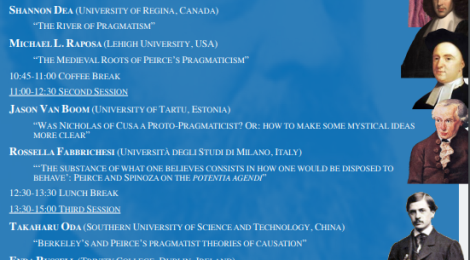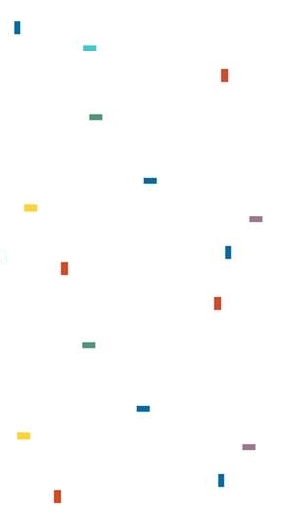
Event: Roots and Anticipations of Peirce’s Pragmatism
Trinity College, Dublin / online
22 June 2023
For a Zoom link, please contact Dr Oda at odat@tcd.ie.
[The following is Irish Summer Time]
8:30-9:00: Tea and Coffee
9:00-9:15 Welcome by Takaharu Oda
9:15-10:45 First Session (each 30mins + 15 mins Q&A)
Shannon Dea (University of Regina, Canada) “The River of Pragmatism”
Michael L. Raposa (Lehigh University, USA) “The Medieval Roots of Peirce’s Pragmaticism”
10:45-11:00 Coffee Break
11:00-12:30 Second Session
Jason Van Boom (University of Tartu, Estonia) “Was Nicholas of Cusa a proto-pragmaticist? Or: How to make some mystical ideas more clear”
Rossella Fabbrichesi (Università degli Studi di Milano, Italy) “The substance of what one believes consists in how one would be disposed to behave’: Peirce and Spinoza on the potentia agendi”
12:30-13:30 Lunch Break
13:30-15:00 Third Session
Takaharu Oda (Southern University of Science and Technology, China) “Berkeley’s and Peirce’s pragmatist theories of causation”
Enda Russell (Trinity College, Dublin, Ireland) “Indispensability arguments and the Kantian roots of Peirce’s regulative pragmatism”
15:15-16:00 Concluding Discussion, chaired by Jason Van Boom
18:00 Dinner
We three organisers aim at a reappraisal of pragmatism, from the perspective of its founder C.S. Peirce and his studies in medieval and early modern philosophy. By pragmatism, contemporary analytical philosophers such as Quine (1981, pp. 27–28) have meant diverse implications about what can be achieved with the use of language and logic by inquiring into or otherwise deflating the truth of propositions about reality. In his inquiry, Peirce was concerned with the conceivability of objects and their effects with practical bearings in the sciences (1878, CP 5.402). Whilst contemporary pragmatists are not necessarily aligned with Peirce’s tradition, it is well worth scrutinising the historical sources of his epoch-making pragmatism in the history of philosophy. This is because his formulation of pragmatism, as he himself avowed, is not wholly original. For example, Peirce writes that: ‘although [pragmatism] is “an old way of thinking”, in the sense that it was practiced by Spinoza, Berkeley, and Kant, I am not aware of its having been definitely formulated, whether as a maxim of logical analysis or otherwise, by anybody before my publication of [“How to Make Our Ideas Clear”] in 1878’ (clarification added, CP 6.490). This historically complicated aspect in Peirce studies is still much neglected, because the documentation of his manuscripts is incomplete and there is much room for different interpretations of his texts. In effect, no individual or group of scholars has systematically regimented the nature of Peirce’s pragmatic method as rooted in the history of philosophy.
Hence, as a group of Peirce scholars, our one-day workshop will systematically and newly emphasise particular historical figures that Peirce mentioned. Not only the early moderns, ‘Spinoza, Berkeley, and Kant’, but also medieval philosophers, such as Duns Scotus (c.1265–1308) and Nicolaus Cusanus (1401–64), will be discussed in relation to Peirce’s pragmatic method. Each of the six panellists (four invited and two of the organisers) will discuss one of the figures in relation to Peirce’s thought. This will be approached from our own historiographical and analytical perspectives on his logic and metaphysics. Moreover, we will promote an engagement with the public, so that we can relate Pierce’s conception of pragmatism to contemporary issues at their deepest and broadest levels. In agreement with the speakers, we will record and publish each talk on an online platform (YouTube), though excluding Q&A sessions with the audience. Finally, we intend that an outcome of the workshop will be published (with suitable modifications) in a special issue of European Journal of Pragmatism and American Philosophy, Transactions of the Charles S. Peirce Society, or Mind. We will thereby establish a new reappraisal and reformulation of Peirce’s pragmatic method as deeply developed from the history of philosophy.
[References]
Peirce, C.S. 1931–58. Collected Papers of Charles Sanders Peirce. Edited by Charles Hartshorne, Paul Weiss, and Arthur Burkes. 8 vols. Cambridge: Belknap Press. [Cited as ‘CP’]
Quine, W.V. 1981. ‘The Pragmatists’ Place in Empiricism’. In Pragmatism: Its Sources and Prospects, edited by Robert Mulvaney and Philip Zeltner, 23–39. Columbia: University of South Carolina Press.
